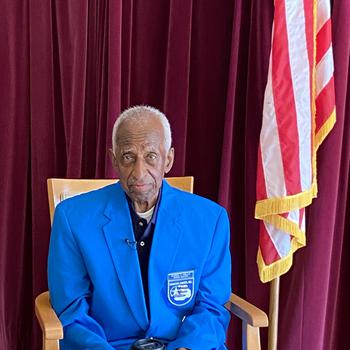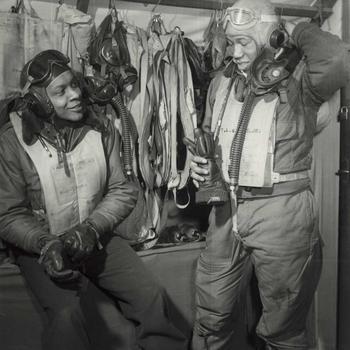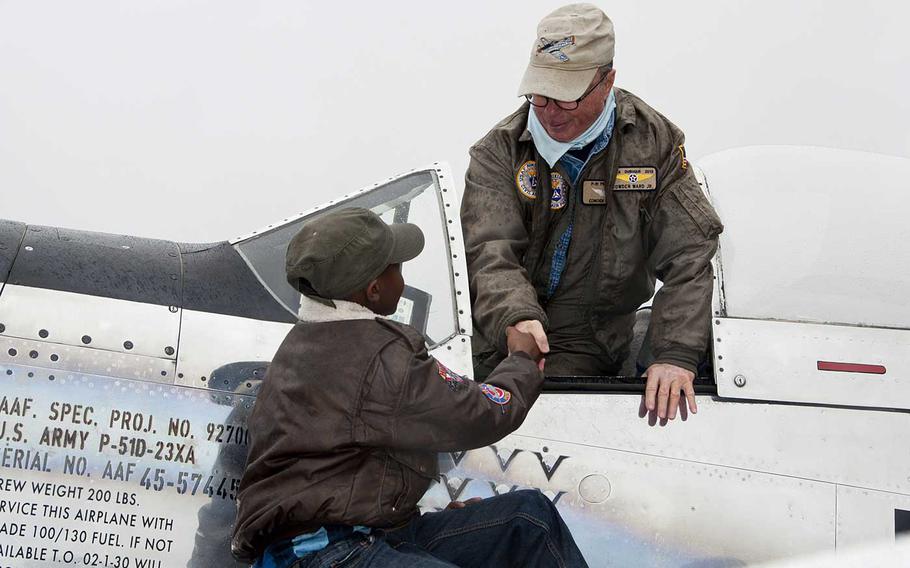
This 1943 photo shows Tuskegee pilots who were recent graduates from training with the Army Air Corps program in Alabama. Tuskegee Airmen included not only pilots but also navigators, bombardiers, support staff and all personnel who kept the planes in the air. (Tuskegee Airmen archives)
WASHINGTON — Nearly 1,000 Black pilots trained at Tuskegee Army Airfield in Alabama during World War II, with nearly half of them eventually deploying overseas to fly patrol and attack missions.
Russell Nalle, a former Army officer, was among them — the first Black aviators in the U.S. armed forces known as the Tuskegee Airmen.
“I was a young guy, and it was an exciting adventure. I wouldn’t have missed that experience for anything,” said Nalle, 103, who recalled strafing enemy aircraft and knocking a freight train from its tracks as he piloted a twin-engine fighter plane over Germany. He was 25 years old.
The pioneering pilots of the World War II unit now number only three. And as Tuskegee Airmen Inc. gathers Thursday through Saturday for its annual convention in Crystal City, Va., to honor the original members, the national nonprofit looks to focus on its mission to cultivate the next generation of Black aviators through hands-on education programs.

Russell Nalle, a former Army officer, is among three of the original Tuskegee airmen still alive. Nalle, who lives in Detroit, said he sees a promising future for young Black men and women who choose aviation careers that were out of reach in the 1940s and 1950s. “I got turned down as commercial pilot. It was not called or identified as discrimination back then. It was part of the culture at the time,” he said. (The Detroit chapter of the Tuskegee Airmen Inc.)
“There are not a whole lot of Africans Americans or people of color among the ranks of pilots. We’re trying to change that,” said Jerry Burton, national president of Tuskegee Airmen Inc.
Black pilots only make up about 3% of all U.S. commercial pilots and 2% of Air Force pilots, he said.
“I recall from my own childhood in the 1970s that many young people did not know those opportunities existed for African Americans,” Burton said.
But at this week’s convention, the remaining Tuskegee pilots will be noticeably absent. None are able to travel because of their advanced age, organizers said.
“Maybe next year,” said Nalle, who lives in Detroit and uses a wheelchair.

The Tuskegee Airmen not only made history as the first Black military pilots, but their contributions led the way for the military to fully integrate its ranks in 1948. (Tuskegee Airmen archives)
Retired Brig. Gen. Enoch “Woody” Woodhouse II, 98, who enlisted in the U.S. Army Air Corps in 1944 and served as support staff with the Tuskegee Airmen, will be there along with roughly 35 teenagers who have participated in Tuskegee Airmen Inc. education programs.
“We look to the past for inspiration but keep our focus on future Black aviators,” Burton said.
Lt. Col. Shelton Ivan Ware, 101, who served as a mechanic with the Tuskegee Airmen, also is scheduled to attend, he said.
Burton and other convention organizers said they are focused on inspiring a new generation of aviators through math and science camps, flight academies and drone certification training at local chapters of Tuskegee Airmen Inc.
The nonprofit funds the youth programs through sponsorships, donations, membership dues and licensing agreements. Chapters also help students pay for higher education through the Tuskegee Airmen Scholarship Foundation.

Youth camps and programs that Tuskegee Airmen Inc. supports for adolescents and teenagers range from an introduction to aviation to hands-on training for aspiring pilots and drone operators. (Tuskegee Airmen archives)
More than 500 teens and adolescents participate in the camps and flight academies each year. Programs range from an introduction to aviation and aeronautics to hands-on training for aspiring pilots and drone operators.
“These are extremely successful ventures and popular, too,” Burton said.
The organization leverages partnerships with other nonprofits and government agencies. A flight academy for disadvantaged youth recently launched through a partnership between the City of New Orleans and Tuskegee Airmen Inc., he said.
Nalle said he sees a promising future for young Black men and women who choose aviation careers that were out of reach in the 1940s and 1950s.
Black aviators today do not face the same barriers that ended his aviation career after the war, Nalle said.
“I got turned down as commercial pilot. It was not called or identified as discrimination back then. It was part of the culture at the time,” he said. “But joining the military was different. I learned about the world. I couldn’t have asked for anything better than learning to fly a plane.”

Russell Nalle kneels in the first row, second from the left, in this undated photo of Tuskegee Airmen who flew fighter planes and provided ground support for the Black air crews during World War II. “I wouldn’t have missed that experience for anything,” said Nalle, who recalled knocking a freight train from its tracks as he piloted a twin-engine fighter plane over Germany. (The Detroit chapter of the Tuskegee Airmen Inc.)